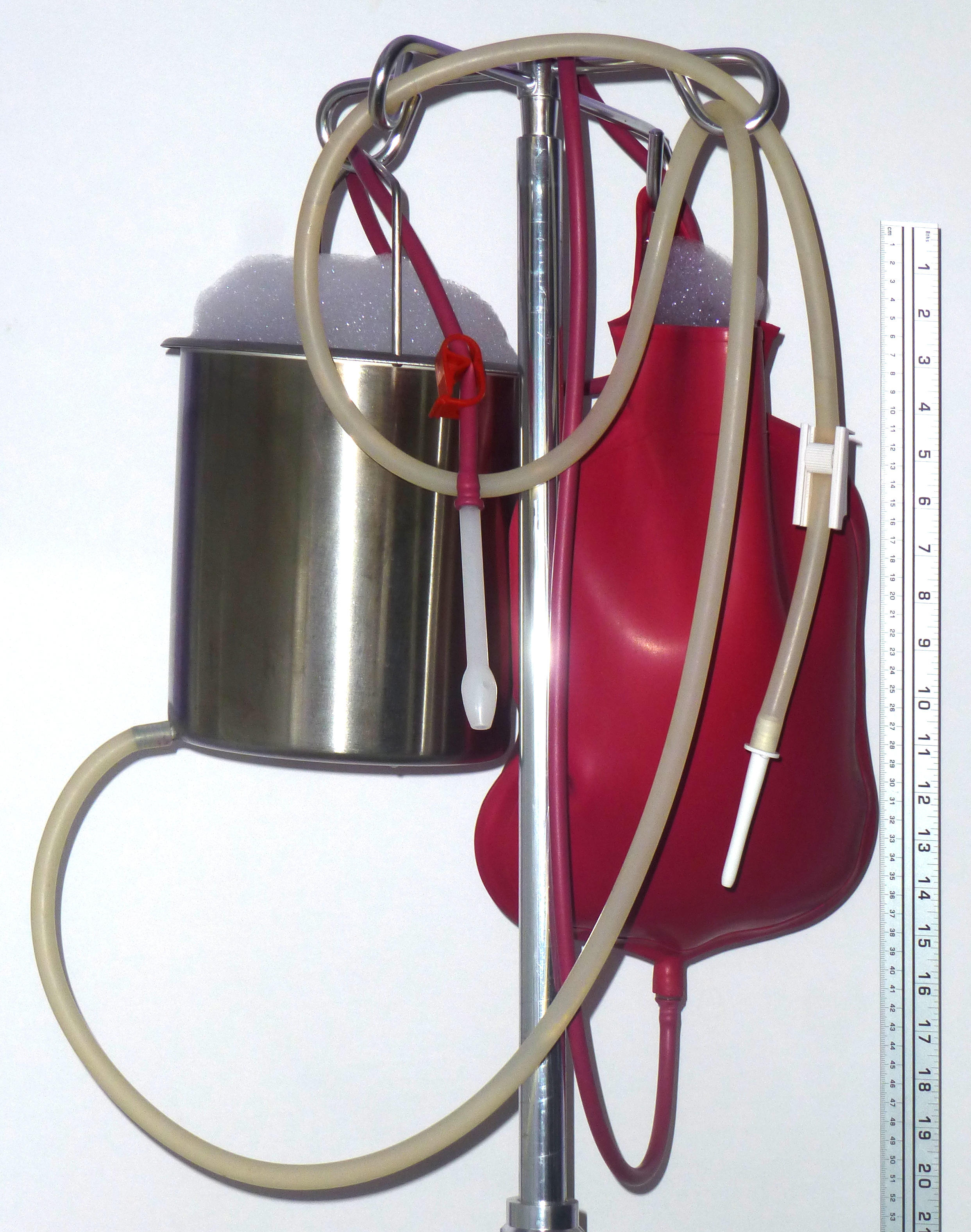|
Coffee Enema
A coffee enema is the injection of coffee into the rectum and colon via the anus, i.e., as an enema. There is no scientific evidence to support any positive health claim for this practice, and medical authorities advise that the procedure may be dangerous. Efficacy and safety There is no medical or scientific evidence to support any detoxification or anti-cancer effect of coffee enemas. Coffee enemas carry a risk of adverse effects, some of them serious, including infection, seizures, heart and lung problems, and death. History The rationale for using enemas can be traced back the earliest medical texts, to the prescientific misconception that the accumulation of faeces in the intestines can lead to autointoxication and that the "cleansing" of intestines can prevent that. The practice of colon cleansing experienced a renaissance in the 1990s, and at this time, coffee enemas were used as alternative cancer treatments. Their frequent use is a feature of Gerson therapy and ... [...More Info...] [...Related Items...] OR: [Wikipedia] [Google] [Baidu] |
Coffee
Coffee is a drink prepared from roasted coffee beans. Darkly colored, bitter, and slightly acidic, coffee has a stimulant, stimulating effect on humans, primarily due to its caffeine content. It is the most popular hot drink in the world. Seeds of the ''Coffea'' plant's fruits are separated to produce unroasted green coffee beans. The beans are Coffee roasting, roasted and then ground into fine particles that are typically steeped in hot water before being filtered out, producing a cup of coffee. It is usually served hot, although chilled or iced coffee is common. Coffee can be prepared and presented in a variety of ways (e.g., espresso, French press, caffè latte, or already-brewed canned coffee). Sugar, sugar substitutes, milk, and cream are often used to mask the bitter taste or enhance the flavor. Though coffee is now a global commodity, it has a History of coffee, long history tied closely to food traditions around the Red Sea. The earliest credible evidence of coffee d ... [...More Info...] [...Related Items...] OR: [Wikipedia] [Google] [Baidu] |
Gerson Therapy
Max Gerson (October 18, 1881 – March 8, 1959) was a German-born American physician who developed the Gerson Therapy, a dietary-based alternative cancer treatment that he claimed could cure cancer and most chronic, degenerative diseases. Gerson described his approach in the book ''A Cancer Therapy: Results of 50 Cases'' (1958). The National Cancer Institute evaluated Gerson's claims and concluded that his data showed no benefit from his treatment. The therapy is both ineffective and dangerous. Early life and career Gerson was born to a Jewish family in Wongrowitz, German Empire (Wągrowiec, now in Poland), on October 18, 1881. In 1909, he graduated from the Albert Ludwig University of Freiburg. He began practicing medicine at age 28 in Breslau (Wrocław, now in Poland), later specializing in internal medicine and nerve diseases in Bielefeld. By 1927, he was specializing in the treatment of tuberculosis, developing the Gerson-Sauerbruch-Hermannsdorfer diet, claiming it wa ... [...More Info...] [...Related Items...] OR: [Wikipedia] [Google] [Baidu] |
Naturopathy
Naturopathy, or naturopathic medicine, is a form of alternative medicine. A wide array of pseudoscientific practices branded as "natural", "non-invasive", or promoting "self-healing" are employed by its practitioners, who are known as naturopaths. Difficult to generalize, these treatments range from outright quackery, like homeopathy, to widely accepted practices like certain forms of psychotherapy. The ideology and methods of naturopathy are based on vitalism and folk medicine rather than evidence-based medicine, although practitioners may use techniques supported by evidence. Naturopathic practitioners commonly recommend against following modern medical practices, including but not limited to medical testing, drugs, vaccinations, and surgery. Instead, naturopathic practice relies on unscientific notions, often leading naturopaths to diagnoses and treatments that have no factual merit. Naturopathy is considered by the medical profession to be ineffective and harmful, raisin ... [...More Info...] [...Related Items...] OR: [Wikipedia] [Google] [Baidu] |
List Of Unproven And Disproven Cancer Treatments
This is a non-exhaustive list of alternative treatments that have been promoted to treat or prevent cancer in humans but which lack scientific and medical evidence of effectiveness. In many cases, there is scientific evidence that the alleged treatments are not effective, and in some cases, may even be harmful. Unlike accepted cancer treatments, treatments lacking in evidence of efficacy are generally ignored or avoided by the medical community and are often pseudoscientific. Alternative health systems * Aromatherapy – the use of fragrant substances, such as essential oils, in the belief that smelling them will positively affect health. There is some evidence that aromatherapy improves general well-being, but it has also been promoted for its ability to fight diseases, including cancer. The American Cancer Society states "available scientific evidence does not support claims that aromatherapy is effective in preventing or treating cancer". * Ayurvedic medicine � ... [...More Info...] [...Related Items...] OR: [Wikipedia] [Google] [Baidu] |
Constipation
Constipation is a bowel dysfunction that makes bowel movements infrequent or hard to pass. The stool is often hard and dry. Other symptoms may include abdominal pain, bloating, and feeling as if one has not completely passed the bowel movement. Complications from constipation may include hemorrhoids, anal fissure or fecal impaction. The normal frequency of bowel movements in adults is between three per day and three per week. Babies often have three to four bowel movements per day while young children typically have two to three per day. Constipation has many causes. Common causes include slow movement of stool within the colon, irritable bowel syndrome, and pelvic floor disorders. Underlying associated diseases include hypothyroidism, diabetes, Parkinson's disease, celiac disease, non-celiac gluten sensitivity, colon cancer, diverticulitis, and inflammatory bowel disease. Medications associated with constipation include opioids, certain antacids, calcium channel blockers, ... [...More Info...] [...Related Items...] OR: [Wikipedia] [Google] [Baidu] |
Retention Enema
An enema, also known as a clyster, is an injection of fluid into the lower bowel by way of the rectum.Cullingworth, ''A Manual of Nursing, Medical and Surgical'':155 The word enema can also refer to the liquid injected, as well as to a device for administering such an injection. In standard medicine, the most frequent uses of enemas are to relieve constipation and for bowel cleansing before a medical examination or procedure; also, they are employed as a lower gastrointestinal series (also called a barium enema), to treat traveler's diarrhea, as a vehicle for the administration of food, water or medicine, as a stimulant to the general system, as a local application and, more rarely, as a means of reducing temperature, as treatment for encopresis, and as a form of rehydration therapy (proctoclysis) in patients for whom intravenous therapy is not applicable. In other contexts, enemas are used by some alternative health therapies, used for enjoyment, chiefly as part of sexual ac ... [...More Info...] [...Related Items...] OR: [Wikipedia] [Google] [Baidu] |




